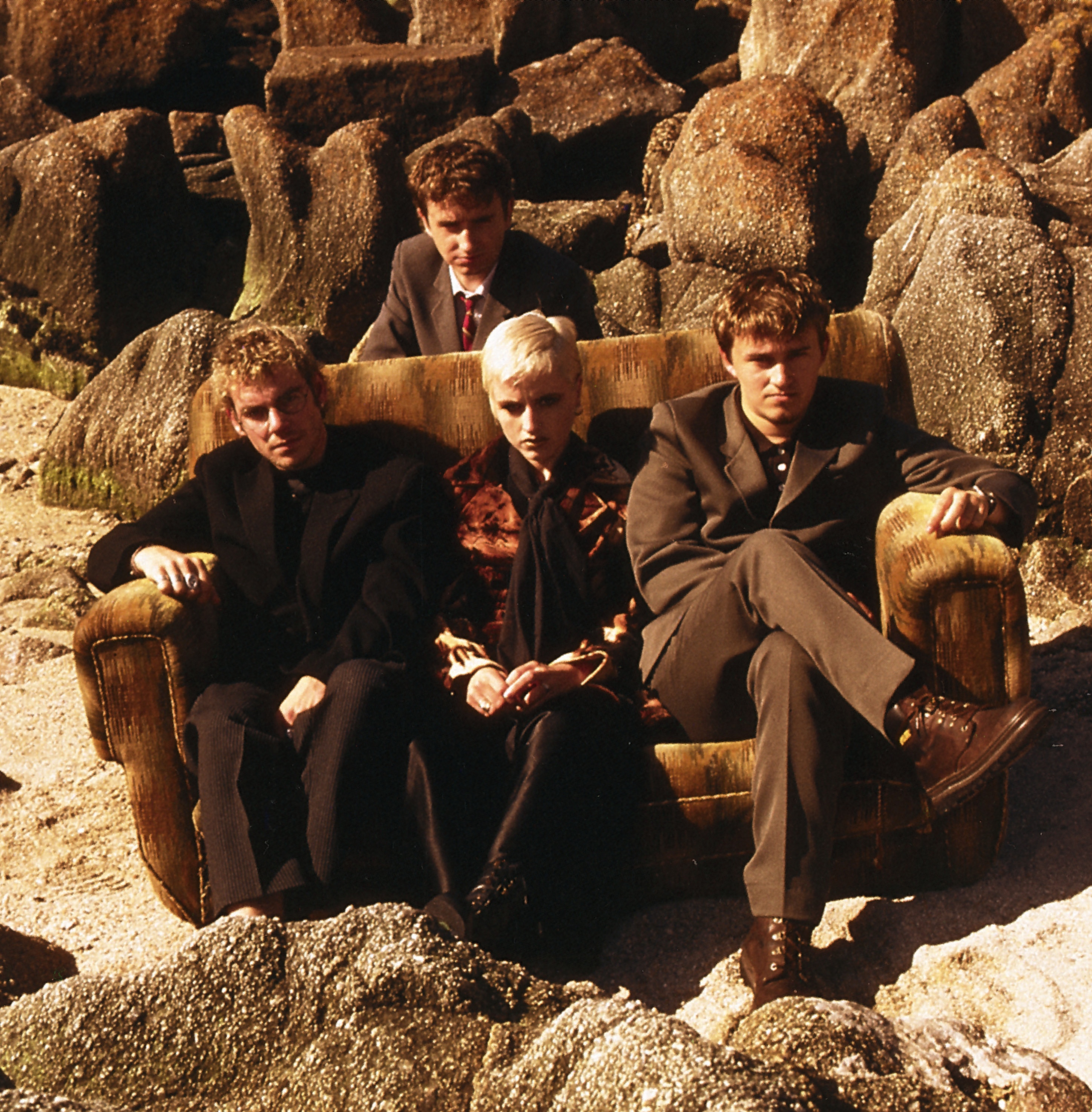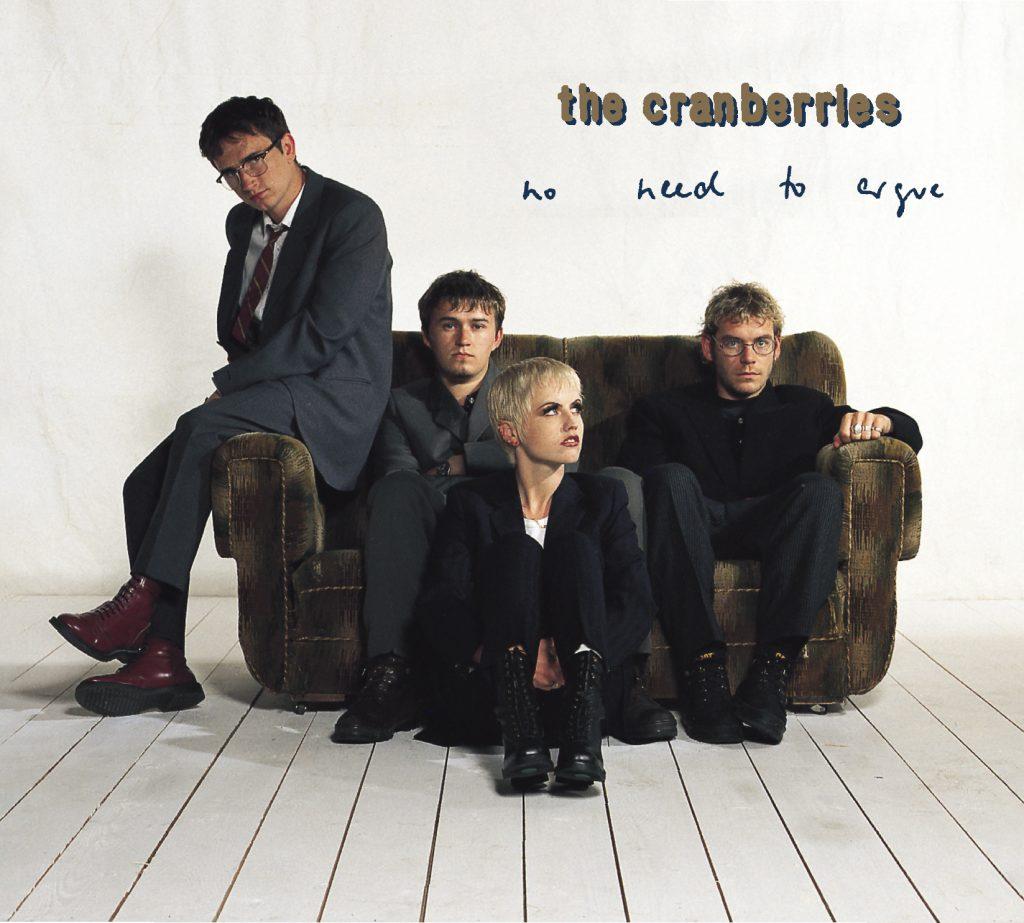Fergal Lawler didn't want to hurt anyone's ears, but Dolores O'Riordan had asked him to play harder.
At the time, The Cranberries were practicing in a tiny garden shed, forcing all parties involved—including Mike Hogan and Noel Hogan—to ease back out of respect for the other. This was not such a moment. "Zombie," a soon-to-be global hit, was being introduced to bandmates by its songwriter, and Dolores said it had to be heavy. Guitars were distorted and, according to Fergal, cymbals were crashing.
These days, No Need to Argue remains the Cranberries best-selling album to date with more than 17 million copies sold to date. "Zombie" was the album's lead single but plenty more were on the way, including "Ode to My Family" and "Ridiculous Thoughts." Now with a brand new remastered box set available, fans can enjoy The Cranberries' biggest album in its most expansive package yet, complete with 19 previously unreleased tracks (and two new songs), live tracks, and plenty more.
We recently spoke to Fergal, the band's drummer, about experiencing a release date in the wake of Dolores's tragic passing in 2018 and what the band expected from No Need to Argue. We also asked the first time Dolores ever came in and told him to play "Zombie."
Analogue: You've been through several official release days, but perhaps not on the other side like this. How are the emotions today?
Fergal Lawler: There's still kind of a butterflies-in-the-stomach feeling, a bit of excitement or whatever. And then obviously there's a bit of sadness because Dolores isn't here, so all of those memories come back as well. I found when we were digging through material for this box set reissue that it was hard because on some live tracks, she's chatting with the audience, and then there's some bits in the studio where you can hear her talking. That was tough.

But I suppose you try to be positive about it. You try and remember the good times. For me, that's what gets me through is remembering the happy times and all the positive things. We created some amazing songs together. She's a great legacy to leave behind, so I try to focus on the positive stuff and not get too down.
Analogue: When did you know you'd have a reissue for No Need to Argue?
Fergal: We weren't sure because Everybody Else was released as a reissued box set as well and it went really well. The record company was delighted. At that stage, they weren't talking about doing another one, but I think the fact that the first one did so well, they thought they should do the same thing again. Originally it was going to be just the standard remastered album and nothing else, but we were kind of pushing for extra stuff. It's really nice to have all of that, the rarities that the hardcore fans especially really appreciate. There were two tracks that were never released, I don't think: "Yesterday's Gone" and "Serious". I think we'd only played "Yesterday's Gone" on MTV's Unplugged and maybe once or twice live, if even. I don't remember.
"Serious" was a song that we'd been working on before we went in to record No Need to Argue, so that was running through it in the studio. For some reason, it just got left behind. I think we got so excited about the other songs and kind of forgot about that, so it was just a rough demo we had of it and that was it. We remastered it and said, 'Look here.' We might have played it live on some stage—we might have—and had no idea. When we were writing on tour, what we would do is rehearse stuff at soundcheck if we had something new. We'd play it a few times over soundcheck and then go, 'This sounds cool. Let's throw it into the set tonight just to freshen things up.' So we might have played it live. I'm not sure.
Analogue: Coming off of Everybody Else is Doing It... you had to know this would be successful, but did you have any clue it would reach this level?
Fergal: No, not at all. We were on a high because Everybody Else was so successful. I think it sold over a million copies and for a first album, the record company was just delighted. They were all excited and said, 'Work away on the second one.' They didn't come near us. I think they trusted us at that stage and said, 'Look, you know what you're doing. Stephen [Street] is a great producer.' He was in control of things, so they let us work away ourselves which is great.
"We created some amazing songs together. She's a great legacy to leave behind, so I try to focus on the positive stuff and not get too down."
We had most of the songs written even before we came into the studio. We'd normally do that anyway. We'd take time in the rehearsing room or, as I said, rehearse songs at soundcheck, so we had a lot of material before we went into the studio. We were very tight as a unit because we'd been touring for two years pretty much non-stop.
We were pretty excited about it. We definitely weren't nervous. We weren't saying, 'Oh god, it has to be better than the last one.' No one was like that. Stephen was like that, I think, saying, 'C'mon guys, this has to be really good.' We were like, 'It'll be fine. Don't worry. It's grand.' You know, we were in our early twenties and you think nothing is impossible. You're just excited so we just said it would be fine. We had the songs and we knew they were good. We'd played them live and the audience reaction was good.
So we were more excited than anything. It was a really enjoyable time. We started out at The Manor Studio in Oxford, like a residential studio apartment. Mike Oldfield did Tubular Bells there. It's a really nice old manor house. We did maybe a month or six weeks out there. It was really relaxing. It was lovely. I just remember it being fun.
Analogue: You were playing the songs out live, which included "Zombie," right?
Fergal: Yes.
Analogue: Do you remember the first time playing that live?
Fergal: I don't remember the first time playing it live, but I do remember the day Dolores came into the rehearsal room with it. We used to rehearse in this tiny little shed in the back garden of a friend's house and it was fucking freezing in there. [Laughs] It was just brick and a roof with felt. It was so cold, so we'd always get in and play as much as we could to warm up.
But I remember Dolores came in and said, 'I have this idea for a song. It needs to be heavy because it's angry.' We couldn't really hear the lyrics because she was singing through her guitar, but she explained that it needed to be angry, that it needed distortion and to hit the drums harder. Normally you're trying to keep it low because you're in such a small room and you don't want to deafen anybody. But on this song, she wanted it heavy. Then we went off on tour and threw that song in the set. It was initially called "In Your Head" and then it got changed to "Zombie" along the way.
Analogue: Did you know it was going to be the hit?
Fergal: We were playing it for a year before we recorded it. For a new song that the audience hadn't heard before, they really reacted to it. We knew there was something special about it. When it came time to pick a single or whatever, we said, 'It has to be this.' The record company and management were like, 'We don't know about that. It could be controversial.' We said, 'Look, we've been playing it live for a year and audiences go bananas for it every night. It's a song they haven't heard before. If that's a judgement of if it's catchy or whatever, that's a sign.' We pushed and pushed and eventually they decided to release it.
Analogue: How many other songs got that sort of electric response? Had others performed similarly?
Fergal: Yeah, "Zombie" and "Dreams" were the two big ones that got a big reaction always.
Analogue: I want to talk about the reissue. Were you surprised by some of the archives?
Fergal: Yeah, like "Serious," which was the song I'd forgotten about. Then the Liverpool Royal Court, I remember that gig. For some reason, even before we found it in the archives, I remembered that show because Forrest Gump was just released and I went to see Forrest Gump during the day in the cinema and then we played the gig that night. For some reason, I remember it like it was yesterday. It's bizarre. It just sticks out in my mind. Listening to that footage was lovely because it was a really nice theatre, a lovely, relaxed atmosphere there. Dolores is just chatting away with the audience. It's different than a full-on rock gig. It seemed a bit more intimate or something.

Analogue: Did your relationship to some of these songs change over the years?
Fergal: Yeah I think maybe the ones that weren't singles, mainly because you haven't heard them so much. I tend to gravitate more toward those, like "Disappointment" is one of my favorite songs. I always had a special thing for it but hearing it back when it was remastered, I was like, 'Oh, yeah. Wow!' It's her voice in the space.
Analogue: What did that album in particular do for the band and what you knew you could do creatively?
Fergal: I just think it just went up another level after that album. We did maybe two years of that tour and I remember something really clicking maybe a couple months into that tour. We went around the world twice and around the second month, there was a huge power on stage that you could feel. That had never happened before. It was like we were playing as a unit and it was almost a palpable energy. We really tapped into that. I think we all realized it. It was almost always something we were striving for to get that huge feeling of energy. It's hard to put into words, but it's like nothing else. I've been to gigs and it's amazing to see.
Analogue: You told me before that you're scoring some projects. I'd love to hear more.
Fergal: I just finished a short film called Hum, which is in the Cork International Film Festival. It was nice. It's about mental health, really. It's about a guy who's all stressed out who goes into an art gallery. An older gentleman is taking his time strolling around the place and they start a conversation about the paintings humming, the energy from the paintings humming. At the end of the film, the stressed out guy is more relaxed. It sends a message to take some time out which I think is appropriate with the situation we're in at the moment. It was nice to do something like that and send a positive message out.
VISIT: The Cranberries

